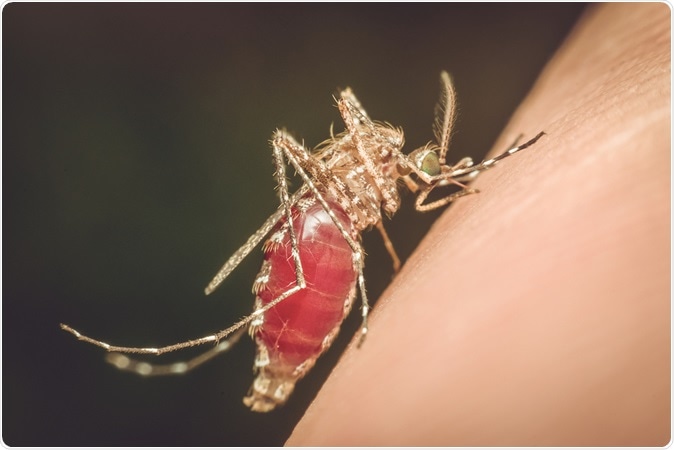The World Health Organization (WHO) has certified that Paraguay has eliminated malaria, being the first country in the Americas to have done so since Cuba was given this status in 1973.

Macro of mosquito (Aedes aegypti) sucking blood close up on the human skin. Mosquito is carrier of Malaria. Image Credit: PongMoji / Shuttterstock
Dr Tedros Adhanom Ghebreyesus, WHO Director General said in a recorded statement, “It gives me great pleasure today to certify that Paraguay is officially free of malaria… Success stories like Paraguay’s show what is possible. If malaria can be eliminated in one country, it can be eliminated in all countries.”
In 2016, Paraguay was identified by the WHO as one of the 21 nations that had the capability to eliminate malaria by the year 2020. The “E-2020 initiative” by the WHO was supporting these 21 nations to work towards activities that could help them become malaria free. Some of the countries on this list include Costa Rica, Ecuador, El Salvador, Belize, Suriname and Mexico.
Dr Carissa F Etienne, Director of the Pan American Health Organization (PAHO), WHO regional office for the Americas said in her statement, “I take pride in saying that PAHO has accompanied Paraguay in the crusade of malaria elimination since the beginning…This is a powerful reminder for the region of what can be achieved when countries are focused on an important goal, and remain vigilant after achieving that goal. We are hopeful that other countries will soon join Paraguay in eliminating malaria.”
Paraguay is malaria-free, message from WHO Director-General
For this feat, Paraguay has a systematic program in place from 1950 to 2011. Malaria was a significant public health challenge in this country with over 80,000 cases being reported a year in the 1940s. Because of the consolidated efforts to curb the mosquito population as well as efforts to prevent spread and recurrence of the disease, the last registered case of Plasmodium falciparum malaria was seen in 1995 and the last registered case of Plasmodium vivax malaria was seen in 2011.
Thereafter a five year place from 2011 was in place to ensure that there were no new cases and the consolidation of the success was maintained. Community education, awareness, vector (mosquito) control, prevention of transmission along with efficient diagnosis and early treatment were emphasized upon. Finally the country could reach a status where malaria is eliminated.
Dr Carlos Ignacio Morínigo, Minister of Health of Paraguay said in a statement, “Receiving this certification is a recognition of more than five decades of hard work in Paraguay, both on the part of public sector workers, as well as the community itself, who have collaborated time and time again in order to achieve the elimination of malaria.” “Reaching this goal also implies that we must now face the challenge of maintaining it. Therefore, Paraguay has put in place a solid surveillance and response system in order to prevent the re-establishment of malaria,” the Minister added.
The Ministry of Health in 2016 had launched a 3 year program to improve the first line health workers. This was funded by The Global Fund to Fight AIDS, Tuberculosis and Malaria. This provided the necessary boost to eliminate malaria. Peter Sands, Executive Director of the Global Fund said, “Paraguay’s success demonstrates the importance of investing in robust, sustainable systems for health, and I’m very pleased that the Global Fund supported this achievement. We need to remain vigilant and prevent resurgence, but we also need to celebrate this victory.”
The final declaration came after the independent Malaria Elimination Certification Panel met in April 2018 and recommended the WHO Director-General certify the country malaria-free. According to the WHO, countries such as Argentina, Algeria and Uzbekistan are next in line to be declared malaria free later in 2018.